James Blight on McGeorge Bundy
One of JFK's "best and brightest" died wondering how the Vietnam War could have gone so wrong. Now, in an important new book, we have some answers.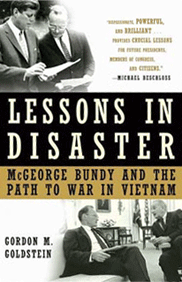
And isn’t it ironic … don’t you think? A little too ironic … It’s the good advice that you just didn’t take, Who would’ve thought … it figures.
— Alanis Morissette, “Ironic” (From the album “Jagged Little Pill,” 1995)
In 1985, the novelist of the Northeast ruling class, Louis Auchincloss (Yale, class of 1939), told an interviewer, “I used to say to my father, ‘Everything would be all right if only my class at Yale ran the country.’ Well, they did run the country during the Vietnam War and look what happened.” What happened was profoundly ironic, as the cream of America’s crop of post-World War II leaders led the country down a rabbit hole into the Vietnam catastrophe.
The irony of the Vietnam War—the best men leading us to the worst disaster — acquired a shorthand referent with the publication of David Halberstam’s 1972 masterpiece, “The Best and the Brightest.” Post-Halberstam, “the best and the brightest” has become one of the most ironical phrases in the English language. “The best and the brightest” led the U.S. into the quagmire of the Vietnam War, according to Halberstam, by their peculiar brand of hubris, derived from good breeding, excellent education, youthful energy and conviction, and the belief that they, acting as proxies for the entire United States of America and the Free World led by Washington, could prevent the world from “going communist.”
In the pre-Halberstam sense, the very brightest and the very best of these men was McGeorge “Mac” Bundy. A super-achiever before the phrase came into common usage, his achievements were equaled only by the supreme ease and apparent nonchalance with which he defeated every competitor in every contest he chose to enter. First in his class at Groton. First in his class at Yale, class of 1940. Dean of Harvard College at the preposterously young age of 34, without even having taken the time and trouble to earn a Ph.D. Witty, erudite, given to quoting Shakespeare and Austen, prone to finishing the sentences of colleagues before they could do so themselves, and more articulately. At age 41, special assistant for national security affairs — what is now called “national security adviser” — to President John F. Kennedy, his former schoolmate at the Dexter School in Brookline, Mass.
Now, more than 35 years after the publication of Halberstam’s devastating critique, it is possible to move beyond the finger-pointing irony of Mac Bundy and the Vietnam War, thanks to Gordon M. Goldstein’s important, poignant and troubling new book, “Lessons in Disaster: McGeorge Bundy and the Path to War in Vietnam” (New York: Times Books, 2008). Goldstein shows us a McGeorge Bundy in old age and in declining health desperately trying to understand where he and his colleagues went wrong on Vietnam. We encounter not the haughty, know-it-all of the Bundy legend who used words like a rapier, but a rather melancholy old man often at a loss for words to describe the depth of his own failure.
For those familiar with his reputation only from the writing of Halberstam and the Vietnam ironists who followed him, the portrait of Bundy that emerges from Goldstein’s book is shocking. For those of a certain age who feel they still hate him for his role in the Vietnam War, their capacity to hate will be challenged by Goldstein’s Bundy, asking himself what he should have done different to avoid the war.
It is, on balance, a stroke of good fortune that a book planned by Bundy and Goldstein was never written, for what we get is not the elevated stentorian prose we associate with Bundy’s published writing, but a kind of uncorrected proof of an elderly man struggling to get closer to an explanation of his culpability for the war—a Mac Bundy seeking to unravel the irony that hounded him for the 30 years he lived after leaving the administration of President Lyndon Johnson in 1966.
Bundy died in the midst of his struggle. We have waited a dozen years since his death for Goldstein’s book. It is worth the wait.
Why Bundy Decided to Write a Book on the Vietnam War
Nothing in Mac Bundy’s post-government career betrayed any clue that he would deal with Vietnam before he died. For although Bundy had not altogether avoided commenting publicly on the Vietnam War after leaving office in 1966, his occasional remarks on the conflict never included any analysis of his own personal role. Following his resignation from the Johnson administration, he became president of the Ford Foundation, where he stayed until 1979, when he joined the history department at New York University. At NYU he devoted himself mainly to issues of nuclear danger. During his tenure at NYU, he occasionally referred to Vietnam in lectures, but only rarely, and seemed to studiously avoid any mention of his role in the escalation of the war in 1965, the year it became an American war. Occasionally, he would be heckled about Vietnam by audiences at one of his many lectures on the nuclear threat, and very occasionally he would respond briefly, saying that he would get to that subject in his own good time. But mainly he avoided the subject altogether in public.
Why then did Bundy, after nearly 30 years of virtual silence on Vietnam, decide to write a book — and a very personal book at that — about his own role regarding Vietnam under both Kennedy and Johnson? Gordon Goldstein tells us that the short answer may be given in just two words: Robert McNamara.
McNamara’s approach to the war in his 1995 memoir, “In Retrospect: The Tragedy and Lessons of Vietnam,” was both deeply personal and historically well grounded in the available documentation. McNamara famously admitted in the book to having been “wrong, terribly wrong,” about nearly every facet of the war, and deeply regretful of its consequences — although the debate still rages over whether he was sufficiently regretful and apologetic. It may at first seem odd that McNamara’s “In Retrospect” would provoke Bundy into writing his own book on Vietnam. For while McNamara’s book became a best-seller, he was savaged from both the left and the right for having the gall, as many saw it, to come forward after 30 years of silence about his role in the escalation of the war in Vietnam. But McNamara forthrightly stated that he blew it on Vietnam, that the documentation showed why and how he blew it, and he even expressed his sympathy with the very individuals who reacted to the book with such anger toward him. As McNamara correctly says in the poignant conclusion to Errol Morris’ Academy Award-winning 2004 film, “The Fog of War,” “a lot of people think I’m a son of a bitch.” One might think that Mac Bundy, in observing the savaging of his friend Bob McNamara, would have vowed never to give the public an occasion to attack him in a similar manner by publishing a book on his own role in the war.
Yet Goldstein is clear: McNamara’s example was decisive. McNamara’s example was the one Bundy sought to follow. In a memorable passage, Goldstein describes the moment when Bundy probably decided to write the book.
On April 17, 1995, Bundy appeared on “The MacNeil/Lehrer NewsHour” on public television as one of a panel of commentators invited to discuss the fierce national argument that McNamara’s book had generated. “I think Bob McNamara has tried very hard to tell it as he now understands it,” Bundy said. “It’s an honest contribution and it will be a very much valued one.”
The anchor, Jim Lehrer, asked about McNamara’s retrospective appraisal, “ ‘We were wrong, terribly wrong.’ Would you accept that yourself?” he asked Bundy.
“Sure,” Bundy replied with a shrug. An awkward beat followed before he added: “I think it’s very unlikely that we were right, looking at the evidence as we now have it.”
Another panelist, the then-Los Angeles Times columnist [and Truthdig co-founder] Robert Scheer, quickly seized on the significance of Bundy’s admission. “You have a guest on your program, McGeorge Bundy, who was certainly as complicit as McNamara,” he told Lehrer. “I don’t know why McNamara should take all the heat.”
The camera cut away for a reaction shot. Scheer’s attack appeared to rattle the 76-year-old Bundy. His sharp blue eyes darted back and forth behind his thick glasses with the clear plastic frames. When his gaze finally steadied, Bundy appeared to betray an emotion utterly inconsistent with his cool, Vietnam-era persona. It was not a look of fear, exactly, but something related to it: a thinly suppressed expression of sudden alarm. The fierce anger directed at McNamara had suddenly been focused on him, and for an instant he appeared uncharacteristically vulnerable. Within days of his television appearance, however, I received a call from Bundy seeking my help in composing his own memoir and retrospective analysis of America’s path to war in Vietnam. Bundy wanted to commence work as soon as possible.
What was it about McNamara’s book and the public reaction to it that led Bundy to want to break his 30-year silence on his role in the war? Knowing that upon publication he too would be excoriated by many for having said too little, too late, and to the wrong audience, why would Bundy want to proceed? Did he feel that some of the verbal abuse to which McNamara was being subjected actually ought to be directed at him? Did he feel his days were numbered, that dead men tell no tales, and that if he wanted his own perspective on Vietnam to be part of his legacy he had no time to lose? Goldstein confesses that he does not know.
Bundy, Goldstein and the Book
Now, more than a dozen years after Mac Bundy asked for Gordon Goldstein’s help, we have Goldstein’s “Lessons in Disaster.” He began as Bundy’s research assistant on the Vietnam book project, but eventually Bundy asked him to become the co-author of anything they might publish. In fact, Goldstein seems to have become something of an alter ego to the man who was formerly so supremely confident that David Halberstam referred to him as “the dean of the world.” By the late spring of 1995, a relationship of equals was established between Bundy and Goldstein.
It was Goldstein’s job to hold a multifaceted mirror of historical reality up to a man who had once seemed able to justify anything and everything he had ever done by the sheer force of his intellect and biting wit — he was, in his youthful prime, said by many to have been a virtuoso of the put-down.
Goldstein also provided Bundy with books, articles and analyses of the scholarly state of the art on the war and Bundy’s role in it. It would have been easy for Bundy to overwhelm Goldstein, fresh out of graduate school. But he clearly did not want to do so. It would also have been understandable if Goldstein had buckled under the famously intimidating glare and the ever-present threat of a peremptory verbal barrage of Bundy, but Goldstein seems to have stood his ground, even when he and Bundy disagreed.
They formed an unusual but highly successful partnership, two members of a team whose common objective was to produce a book, rooted in the documentary record, and containing Bundy’s deepest reflections on the tragedy in Vietnam. It cannot have been easy for either Bundy, who defied the wishes of his family in resurrecting the ghosts of the Vietnam War yet again, or for Goldstein, less than half Bundy’s age and, at the outset, with almost no background in the vast literature of the Vietnam War. Spurred on by Goldstein, Bundy annotated documents, tape-recorded dozens of hours of comments, wrote out original fragments to be used later in the book he and Goldstein were planning, and generated, all told, a substantial body of commentary by Bundy on the war. Now, a dozen years after Bundy’s death, and following a long and complex negotiation with the Bundy family over the right to publish the new material, Gordon Goldstein has written his own book about Bundy and the war. This is Goldstein’s book, not Mac Bundy’s. But in addition, Goldstein has arranged and supplemented Bundy’s original contributions so that McGeorge Bundy, a key architect of the war in Vietnam, in effect speaks from the grave about the war that, in the eyes of many, came to define his life.
“Lessons in Disaster” is not primarily a book about the Vietnam War, although it is well anchored in the literature of U.S. decision-making on the war. Instead, it is foremost the story of a quest — personal, historical and even moral — of a major public figure searching for the roots of his own mistakes and his own culpability. Goldstein does not review the major developments in the war, because such surveys can be found in hundreds of other books, and because making the book top-heavy with Vietnam-era context would also have distracted readers from Goldstein’s central mission, which is to tell the story of Bundy’s quest. The annotated cast of characters at the beginning of the book is helpful. An appendix containing a basic chronology of the war would also have been helpful to readers who lack a thorough grounding in the Vietnam War.
Bundy’s reading of the documentary evidence led him, according to Goldstein, to two conclusions: First, JFK was not going to send U.S. combat troops to Vietnam, because he didn’t believe that such a guerrilla conflict could be won by introducing large numbers of foreign combat troops. Second, virtually nothing could have prevented LBJ from sending combat troops to Vietnam, because LBJ was unwilling to face the political fallout he believed he would have encountered if he had withdrawn, as JFK had already begun to do in late 1963. This became the point of departure for Bundy and Goldstein: The Vietnam War was Lyndon Johnson’s war, not John Kennedy’s war.
Bundy, by his own admission in marginalia, fragments and interview material he produced with Goldstein, understood none of this in real time. Here are three examples of Bundy’s cluelessness — his habitual inability to understand the presidents he served with in regard to the conflict in Vietnam.
By November 1961, JFK had told his senior advisers nearly a dozen times on the record, in meetings whose minutes we have, that he was not sending combat troops to Vietnam. Bundy was foremost among those who did not get it, who failed to understand JFK’s reasoning — which was that guerrilla wars could not be won by large foreign armies that would eventually go home and leave the guerrillas in charge. In 1961, Bundy apparently did not believe Kennedy was serious about letting South Vietnam go, if it came to that. On Nov. 15, just before a pivotal meeting of JFK with his national security team, Bundy wrote to Kennedy in a tone more often reserved for asking someone if he is free for lunch, rather than in a memorandum to a president having to address the gravest matter he can face, which is whether to commit the nation to a foreign war. Bundy began, “So many people have offered their opinions on Vietnam that more may not be helpful. But the other day at the swimming pool you asked me what I thought and here it is.” As Goldstein reports, Bundy was retrospectively appalled by the content and tone of his memo: so clueless about his president, so flippant about matters of war and peace, life and death.
Transcripts are now available of audiotapes made secretly by JFK during meetings of his advisers on Oct. 2 and 5, 1963. McNamara and Gen. Maxwell Taylor, the chairman of the Joint Chiefs of Staff, have just returned from South Vietnam. McNamara recommends to Kennedy that the first 1,000 U.S. advisers (out of roughly 16,000) be pulled out by the end of 1963 with most of the remaining advisers to be withdrawn by the end of 1965. Taylor concurs. Bundy does not. Bundy asks McNamara, “What’s the point of doing it?” McNamara responds, “We need a way to get out of Vietnam. This is a way of doing it.” JFK responds affirmatively, and the order is given to announce the 1,000-man pullout in a public statement a few days later. Again, JFK follows through on his intention not to get bogged down in a war in Vietnam, but Bundy still does not get it. He is again on the wrong side of the argument. He is at odds with his president. He is also at odds with history, for we know what happened after Kennedy’s death. Johnson would prove far more amenable to Bundy’s proclivity toward the introduction of combat troops. In early February 1965, LBJ sent Bundy on his first trip to Vietnam as part of an overall evaluation by the administration as to whether they should “get in or get out” of Vietnam — whether they should send combat troops to Vietnam in large numbers, or find a way to exit the deteriorating situation as soon as possible. While Bundy was in Vietnam, the insurgents struck a base in Pleiku, in the Central Highlands, killing several Americans, wounding more than 100, and destroying U.S. helicopters and airplanes under the jurisdiction of the South Vietnamese allies of the United States. Bundy flew immediately up to Pleiku from Saigon to view the damage and visit with the wounded American advisers. In a book to be published soon, LBJ aide (now PBS journalist) Bill Moyers is quoted as he describes (at an April 2005 conference in which Gordon Goldstein also participated) his own reaction to listening to Mac Bundy’s phone call to LBJ from Vietnam on Feb. 7, 1965.
Moyers: McGeorge Bundy was a different man after Pleiku. … I guess it has something to do with when you hear the firing of the shells. When you are present, something happens to you. He was a different man after that. … I was actually in the room when Mac called from Pleiku and told the president.
Goldstein: And did you sense a great depth of emotion in his recounting those events?
Moyers: Yes. … He was always crisp, collected and composed, but there was a timbre in his voice that day on the phone. Granted it was a military phone with poor reception, but I had never heard such emotion in his voice. I had never heard it, even after the assassination. When he came back, he had recovered, but he was different. (Quoted in James G. Blight, janet M. Lang and David A. Welch, “Vietnam If Kennedy Had Lived: Virtual JFK,” to be published in January 2009 by Rowman & Littlefield.)
On the flight back to Washington, Bundy and his aides drafted a memo that recommended to LBJ that he order at once “sustained reprisals” against North Vietnam. LBJ agreed. Within a month, the first U.S. Marines had arrived in Vietnam, with hundreds of thousands of U.S. troops to follow. This time, Bundy agreed with his president, a fact he would regret to the end of his life.
In Retrospect: Why Bundy Didn’t Get It
The most moving and interesting sections of “Lessons in Disaster” are those Goldstein devotes to Bundy’s struggle to discover why he didn’t get it. Why did he not understand that JFK was not going to have an American war in Vietnam? Why did he not grasp what McNamara and Taylor understood by October 1963, that the U.S. under JFK was pulling out of Vietnam? And why did he find himself agreeing with LBJ in 1965 on what may have been the most disastrous presidential decision in American history prior to the 2003 invasion of Iraq — LBJ’s decision to send in the U.S. military to take over the war from the South Vietnamese?
Why, Goldstein asks over and over again in this book, did Bundy advise his presidents so badly — so consistently badly — on Vietnam? Regardless of one’s view of Bundy and his role in the war, it is difficult not to feel some sympathy for him. One can almost see him squirming in his desk chair, scribbling to himself, as he peers into the abyss of his own culpability.
Goldstein does give us a few clues. The Bundy of the 1960s that emerges in “Lessons in Disaster” is given to what seems to be a variant of performance art. He seems to be performing even in memos, which are often filled with a “hi-ho” cheerfulness that may belie an unwillingness to probe the darker recesses of the horrors and consequences of a war he repeatedly asks his presidents to escalate. Sometimes it even appears that to Mac Bundy, deciding whether to go to war in Vietnam is largely a game. For example, Goldstein tells us that Bundy heard from his aide Jim Thomson in December 1964 that going to war in Vietnam would be a disaster. Bundy responds jovially: “Well, James, that’s a good point. You may well be right. Thank you so much.”
Bundy’s retrospective defense, according to Goldstein, was that Thomson’s view did not matter, just as Bundy’s own view didn’t matter, because “Johnson had decided to have his war.” But, one wonders, how would Bundy know, since he himself seems never to have recommended otherwise.
In order for the “lessons” in disaster really to apply to the world as it is now, and may be in the future, we need to know more about why Bundy was unable to grasp in real time what was obvious in retrospect. After all, history will continue to unfold in real time, not recollected time. While Goldstein’s book is not primarily an effort to explain Bundy’s obtuseness, he does provide a tantalizing clue as to a possible conclusion Bundy might have reached, if he had lived to complete the book. In a fragment dated Feb. 3, 1996, Bundy wrote: “What can we say is most surprising? The endurance of the enemy.” When I read that passage, roughly two-thirds of the way through the book, I stopped and read it again, then read it a third time. I thought to myself: Bundy is actually admitting in this fragment that he did not understand the enemy. Who knew that the Vietnamese communists would withstand the heaviest bombing campaign in history and still retain the capacity to fight the Americans successfully? Who knew that they were so committed to their cause of uniting the country under Hanoi’s leadership that nothing, short of genocide, would have dissuaded them? The answer is that a lot of people inside and outside the U.S. government knew, but Mac Bundy wasn’t interested. He didn’t understand the enemy because, frankly, he didn’t think they warranted his attention. It is a remarkable admission.
Yet Bundy was inconsistent on this point, even in retrospect. On Aug. 28, 1996, my wife janet Lang and I had an extended encounter with the Mac Bundy of old, who could not bring himself to inquire deeply into the motives and capabilities of the Vietnamese communists. We spent the day with Mac and his wife, Mary, at their summer home in Manchester, Mass. Our purpose was to recruit Bundy to our conference in Hanoi the following spring, the first ever at which former high-level North Vietnamese and U.S. decision-makers would discuss the escalation of the war in the 1960s. Bundy’s close friends Bob McNamara and former Deputy Secretary of State Nick Katzenbach would be leading the U.S. team to Hanoi. We finally popped the question, toward the end of a lively, meandering three-hour discussion of the briefing notebook for the conference, which we had sent to him a month or so before our visit.
Instantly, his answer was “no.” After three hours of genteel banter about Vietnam between the three of us, he was suddenly interrogating us. What on Earth, he wondered, did we expect to accomplish by going to Hanoi? Did we really expect the communist Vietnamese government in Hanoi, with its tradition of total secrecy about its decisions, to reciprocate our own efforts to produce critical declassified documents and the forthright testimony of former top-level decision-makers? And why did we expect the Hanoi government to admit mistakes, to admit to having missed opportunities to avoid the war or lessen its damage, when Hanoi had won the war—at a terrible cost, of course, but still, as Mac repeatedly reminded us, they had won it. Why, therefore, would former members of the Hanoi government want to look back on the war in search of their own shortcomings?
He suspected, he said, that the former North Vietnamese officials would gleefully talk about U.S. mistakes, but not their own, leading to the conclusion that the Americans missed all the opportunities to avoid or reduce the impact of the war. Looking for missed opportunities in Hanoi, Mac told us, was “like looking into an empty box.” There was nothing there.
With the end of the lecture, we headed to lunch. On the way from the porch to the dining room, he told us he thought we should go ahead and hold the conference, but we should count him out. He reminded us, apparently without irony, that, after all, he was really interested in Kennedy and Johnson and the war, not the Vietnamese communists.
Thus to a significant degree, it seemed to janet Lang and me in late August 1996 that Mac Bundy was still clueless after all these years. For why was Kennedy right and Johnson (and Bundy) wrong? Because Kennedy understood “the endurance of the enemy,” while Johnson and Bundy did not. By August 1996, the evidence from the fragments that Goldstein provides suggests Bundy was starting to get it, intellectually. Yet he still would not trouble himself to gather some firsthand data on an enemy whose tenacity and skill would leave an irreparable blot on his reputation and legacy, even if someone else was willing to set everything up for him in advance.
A Lesson for Obama
In the Dec. 18, 2008, issue of The New York Review of Books, Joan Didion warns of a potential danger faced by Barack Obama celebrants who chose to enter what she calls “the irony-free zone.” She worries that when the Obama campaign slogan “yes we can” meets the hard reality of “no you can’t” after his inauguration on Jan. 20, 2009, it may be tempting for many Obama supporters to cling to their much-loved slogan rather than to confront head-on our inability to avoid many unsavory possibilities.
Since Didion sent her piece off to The New York Review, television commentator and former Clinton White House communications director George Stephanopoulos has reported on his Web site (on Nov. 24) that “one Obama adviser told me the Obama cabinet is shooting for a combination of a Team of Rivals and the Best and the Brightest. …” This drew the following response from PBS commentator Mark Shields: “It’s the same description of the team which led us into Vietnam. … I guess he didn’t read the end of the book” (“The NewsHour With Jim Lehrer,” Nov. 28, 2008).
It is not premature to ask even now, several weeks before the inauguration of President Barack Obama, whether Obama’s advisers in foreign affairs will come to see themselves as the best and the brightest, without the quotation marks and, if they do, whether they and their new president will continue to insist, as they have throughout the campaign, that the “problem” of Afghanistan can be solved via the introduction of tens of thousands of additional combat troops.
No country in modern times has introduced large numbers of troops into Afghanistan and not regretted having done so. The Russians, to take a recent example, suffered 100,000 casualties and left humiliated in defeat. The lesson of lessons to be derived from Gordon Goldstein’s instructive and timely book is this: Keep the quotation marks around “the best and the brightest.” Stay in the irony zone in real time and avoid having to revisit it, like Mac Bundy, retrospectively.
James G. Blight is a professor of international relations at Brown University’s Watson Institute for International Studies, and author or co-author of half a dozen books on the Cuban missile crisis. He is the author most recently of “Vietnam, If Kennedy Had Lived: Virtual JFK” (with janet M. Lang and David A. Welch), to be published in January by Rowman & Littlefield. He is also a producer of the Koji Masutani film based on the book.
Your support matters…Independent journalism is under threat and overshadowed by heavily funded mainstream media.
You can help level the playing field. Become a member.
Your tax-deductible contribution keeps us digging beneath the headlines to give you thought-provoking, investigative reporting and analysis that unearths what's really happening- without compromise.
Give today to support our courageous, independent journalists.

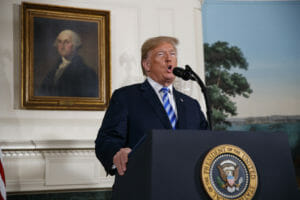
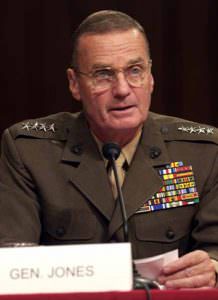

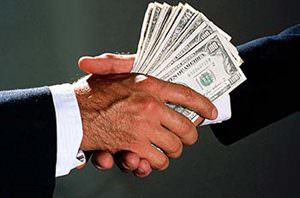

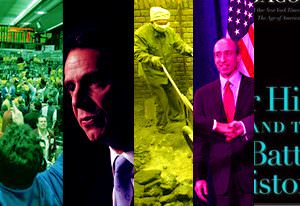
You need to be a supporter to comment.
There are currently no responses to this article.
Be the first to respond.